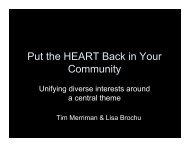Download PDF - Sustainable Tourism Lab
Download PDF - Sustainable Tourism Lab
Download PDF - Sustainable Tourism Lab
Create successful ePaper yourself
Turn your PDF publications into a flip-book with our unique Google optimized e-Paper software.
The Future of <strong>Sustainable</strong> <strong>Tourism</strong> in Rhode Island<br />
Thursday, January 28, 2010<br />
• <strong>Tourism</strong> activities, and especially the actions of tourism enterprises, can ruin the social and<br />
natural wealth of a community. The intrusion of large numbers of visitors into local social<br />
systems can add stress to pre-existing infrastructure, social relationships and values. <strong>Tourism</strong><br />
in natural areas is even more sensitive as it can destroy local ecological, economic and social<br />
systems.<br />
• Rhode Island recognize these issues (it is a signatory to the Geo<strong>Tourism</strong> Charter) and<br />
favors the “green economy” (a RIEDC mandate). Attempts to implement the Geo<strong>Tourism</strong><br />
have stalled; and but of more concern is the fact that tourism does not have a seat at Rhode<br />
Island’s Green Economy Roundtable.<br />
• Rhode Island’s attempts to foster a sustainable tourism industry have met with pockets of<br />
success (recognition of the Blackstone Valley and creation of the National Heritage Corridor),<br />
but deliberate and full-scale attempts at creating a sustainable tourism industry have yet to<br />
occur. This Summit was intended to jump start such initiatives.<br />
• Prevailing economic conditions have hit Rhode Island hard. RIEDC has set its sights on<br />
“Getting Rhode Island Working Again”. Attracting new businesses and creating jobs have<br />
top priority. Putting the economy ahead of sustainable tourism, however, exemplifies the<br />
proverbial tension between pragmatism and principle, but the dilemma can be resolved.<br />
Economics and sustainability are mutually compatible and dependent. First-order priority is<br />
saving the 63,000 existing tourism jobs.<br />
The hemorrhaging can be stopped. But, since tourism businesses in Rhode Island are<br />
predominantly small, under-funded and locally-owned they need help. Saving these<br />
businesses and their communities is essential. The drastic decline in tourism revenues needs<br />
to be analyzed and turned around. As revealed at this Summit, sustainability and resilience<br />
call for investment in new capabilities, new competencies and new innovations. When the<br />
tourism infrastructure is strengthened and communities and natural areas regenerated, new<br />
tourism businesses will arise, and new jobs will be created.<br />
• Competition for visitors, especially among the North Eastern States, is intense. While more<br />
people are traveling closer to home these days, they want experiences that are unique, totally<br />
engaging and delightful. Rhode Island may think it has an advantage in leisure consumption<br />
because behavior is shifting toward more outdoor and healthy pursuits, however the state’s<br />
distinctiveness and differentiation has yet to resonate. Interest in communities, heritage,<br />
culture and nature is particularly strong, but what can communities do to clarify and confirm<br />
their unique identity – beyond branding?<br />
Summit participants noted that actual and perceived barriers to visitation need to be first<br />
recognized and then broken down. Then it is necessary to enhance and more effectively<br />
communicate the charm, appeal and vibrancy of the communities. Creating exciting visitor<br />
experiences that match the interests and exceed the expectations of particular people, especially<br />
different generations within families, is essential. This can’t be achieved simply through mass<br />
marketing. Greater attention needs to be given to one-to-one marketing, creating an undeniable<br />
Summit Report<br />
6





